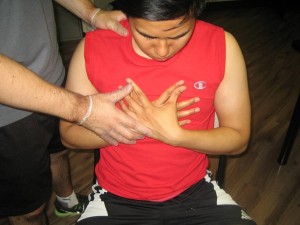Heart palpitations are heartbeats that abruptly become evident. The heart feels as if it is fluttering, pounding or beating erratically, often for only a few seconds or minutes. These sensations can be felt in the neck or throat.
The palpitations might seem alarming but most cases are relatively harmless and not an indication of a serious issue. Oftentimes, the individual might feel an extra or missed beat. These are called as ectopic beats and not an issue to worry about.
What are the causes?

- Lifestyle triggers – alcohol, smoking, strenuous exercise, caffeine, prohibited drugs
- Heart conditions – heart failure, heart valve issues, congenital heart disease, hypertrophic cardiomyopathy
- Emotional and psychological triggers – stress, anxiety, nervousness or excitement, panic attacks
- Hormonal changes – pregnancy, menopause
- Medications – asthma inhalers, antihistamines, high blood pressure medications, antidepressants, antibiotics, antifungal medications
- Heart rhythm issues – atrial fibrillation, supraventricular tachycardia, atrial flutter
- Other medical conditions – hyperthyroidism, anemia, hypoglycemia, dehydration
When to consult a doctor
There is no need to consult a doctor if the heart palpitations pass quickly and manifest only occasionally. These are not likely to be caused by a serious issue and do not require treatment.
It is still best to consult a doctor if:
- The heart palpitations last for an extended period, do not improve or continue to worsen
- History of heart problems
- Worried about the palpitations
When to seek emergency care
Call for emergency assistance or bring the individual to the nearest emergency department if the individual has heart palpitations and any of the following:
- Chest pain or tightness
- Severe episodes of shortness of breath
- Fainting or blackouts
- Dizziness or lightheadedness
It is important to note that these symptoms might indicate a serious or potentially life-threatening heart condition that should be assessed by a doctor as soon as possible.
